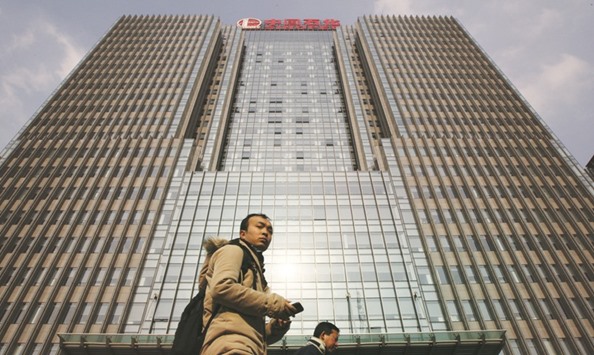China Petroleum & Chemical Corp (Sinopec), the world’s biggest oil refiner, posted a 22% decline in profit for the first half of the year as oil’s collapse overpowered the boost from cheaper crude used to make fuels and chemicals.
Net income dropped to 19.9bn yuan ($3bn), the Beijing-based company known as Sinopec said in a statement to the Shanghai stock exchange yesterday. Revenue slumped nearly 16% to 879.2bn yuan, the company said.
China’s economy will continue to grow steadily in the second half of the year, driving domestic demand growth for fuels and chemicals, the company said in its Chinese-language statement yesterday.
The oversupply in the international oil market is expected to continue and international oil prices will remain low and volatile, the company said.
One of China’s so-called Big Three oil companies, Sinopec’s earnings compare with a 98% profit drop by rival PetroChina Co, the country’s biggest producer, and the first- ever half-year loss by Cnooc, its largest offshore explorer.
Oil refiners typically gain when crude slumps since they benefit from cheaper supply costs, though Sinopec is still vulnerable to the price collapse as it’s the country’s third- biggest oil and gas producer.
Brent crude, the global benchmark, averaged about $41 a barrel during the first half of the year, down roughly 30% from the same period in 2015.
Sinopec’s operating profit in the first half of the year from refining rose to 32.6bn yuan from 15.3bn yuan in the same period in 2015, while earnings from its chemicals business slipped to 9.7bn yuan from a 10.1bn yuan.
Exploration and production posted a loss of 21.9bn yuan in the first six months, compared with a 1.8bn yuan loss a year ago.
Marketing and distribution was little changed at 15.8bn yuan.
Crude production in the first half of the year dropped 11.4% to 154.2mn barrels, the company said in the statement, while natural gas output rose 10% to 388.7bn cubic feet. In the second half of the year, Sinopec expects crude production at 147mn barrels, with 125mn coming from its domestic fields and the remainder overseas. Natural gas output will rise to 421.2bn cubic feet.
Sinopec will raise refining throughput to 120mn tonnes in the second half of the year, from 115.9mn in the first six months, the company said.
China’s oil refiners earlier this year got a boost from a government policy that halts retail fuel price adjustments when oil falls below $40 a barrel, putting a floor under gasoline and diesel prices while crude continued to drop. The rule boosted margins during Sinopec’s first quarter, when net income tripled from a year ago to 6.66bn yuan.
The nation’s refiners processed a record amount in the first half of 2015 as they capitalized on oil’s drop to a 12-year low and as independent refiners took advantage of looser restrictions on how they source crude and sell fuels. Refinery runs averaged 10.7mn barrels a day last month, slipping 2.7% from June’s record 11mn, as plants shut for seasonal maintenance.
Profits from fuel making have started falling at integrated refiners from Exxon Mobil Corp to Royal Dutch Shell as demand growth slows.
Global refining margins averaged $13.80 a barrel in the second-quarter, down from more than $19 in the same period last year, according to BP. Asian oil refiners from Singapore to South Korea are cutting operating rates as they grapple with a slump in margins.
Exploration and production has also taken a hit. High costs and low prices have resulted in a decline in China’s domestic crude output, where ageing fields are becoming too expensive to maintain. The country’s total crude output has slipped 5.1% in the first seven months of the year, while gas output has increased 3.1%.
Capital expenditure in the first half of the year fell more than 40% to 13.5bn yuan, Sinopec said.

Pedestrians walk past the China Petroleum & Chemical Corp (Sinopec) headquarters in Beijing. The world’s biggest oil refiner posted a 22% decline in profit for the first half of the year as oil’s collapse overpowered the boost from cheaper crude used to make fuels and chemicals.
